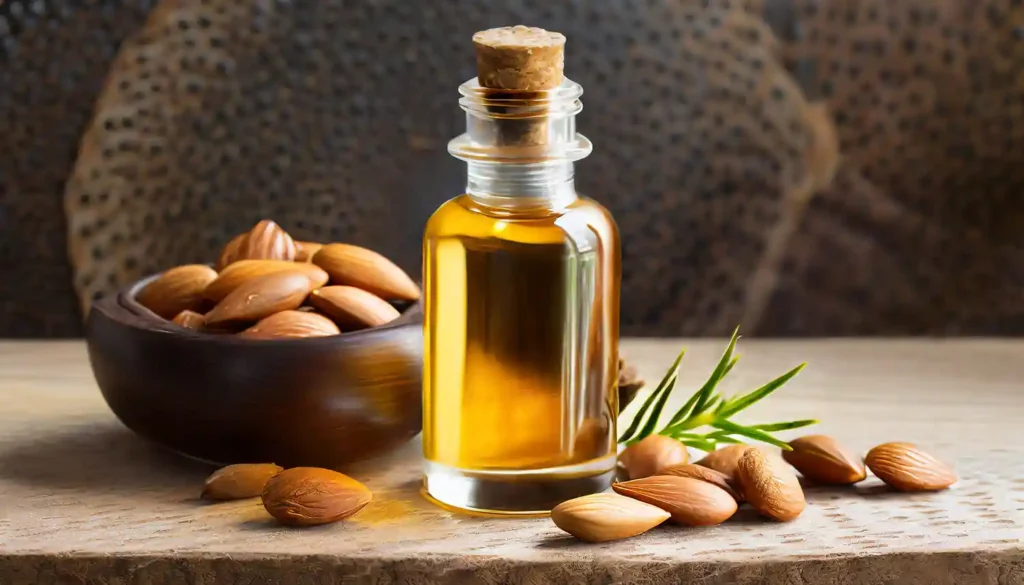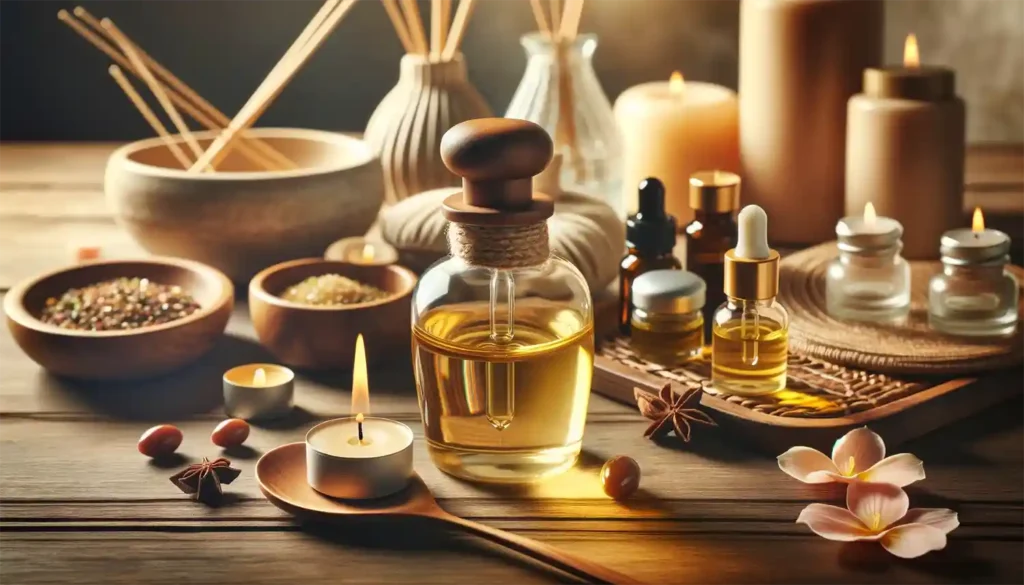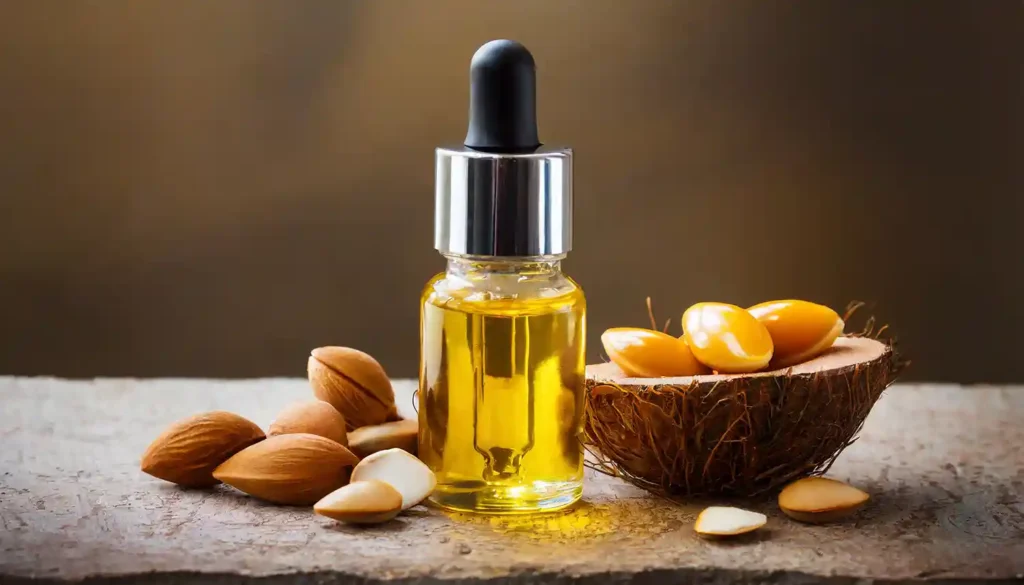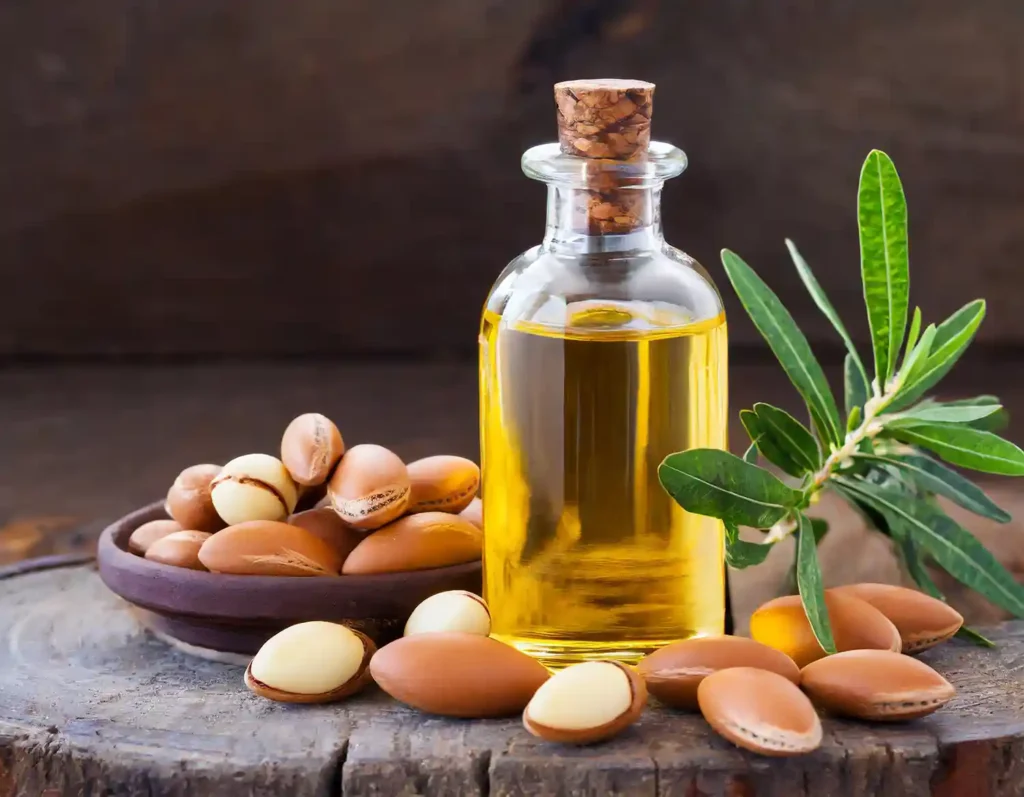Argan oil, often called ‘liquid gold,’ is a rare and precious oil that has captivated the world with its unique benefits and versatile uses. Extracted from the kernels of the argan fruit from the Argan tree, which is endemic to Morocco, this oil has been a cornerstone in beauty, health, and cuisine for centuries.
What is Argan Oil?
Argan oil is derived from the fruit of the Argania Spinosa tree, found in the southwest region of Morocco. This oil is rich in omega fatty acids, antioxidants, and vitamins, particularly Vitamin E.
Traditionally, it is extracted through a labour-intensive process, which adds to its exclusivity and value. Its unique composition makes it highly sought-after for various uses, from culinary delights to cosmetic and medicinal applications. It is often sold as pure oil, which can be directly applied to the skin or used as a carrier oil for essential oils.
Historical and Cultural Significance
Argan oil dates back centuries in Moroccan culture, where it has been cherished for its health and beauty benefits and its significance in local traditions. It is vital in daily life, often used in traditional dishes and as a natural skin and hair care remedy.
The Argan tree, from which the oil is derived, is so crucial to the region that it was declared a UNESCO-protected biosphere, highlighting this unique natural resource’s cultural and ecological importance.


Nutritional Profile and Properties
Argan oil is a culinary delight and a nutritional powerhouse, packed with components beneficial for health and wellness. Its unique composition sets it apart from other oils, making it a valuable addition to both diet and skincare routines.
Key Components of Argan Oil
The oil predominantly comprises omega fatty acids, the most prominent being oleic and linoleic acids. Oleic acid, a monounsaturated fat, is known for its heart-healthy properties, while linoleic acid, an essential polyunsaturated fat, plays a crucial role in skin and hair health.
Argan oil is also rich in vitamin E, a potent antioxidant that can protect the body from the damaging effects of free radicals. Additionally, it contains other beneficial compounds like CoQ10, melatonin, and plant sterols, which contribute to its antioxidant and anti-inflammatory properties.
Key Properties
Argan oil’s nutritional profile and properties make it a versatile and beneficial oil for various uses, from enhancing culinary dishes to providing skincare and health benefits. Its unique blend of fatty acids, antioxidants, and anti-inflammatory compounds sets Argan oil apart as a valuable natural resource.
The rich antioxidant properties of Argan oil are primarily attributed to its high vitamin E content. This helps neutralise free radicals in the body, reducing oxidative stress and potentially lowering the risk of chronic diseases.
Its potential anti-inflammatory properties may be beneficial in soothing skin conditions and reducing inflammation. These properties make Argan oil a valuable ingredient in skincare products and a healthy supplement for overall health maintenance.

The Benefits of Using Argan Oil
Argan oil is celebrated for its array of health benefits, which stem from its rich nutritional profile and may contribute to various aspects of health and wellness.
Heart Health and Cholesterol Management
One of the most significant benefits of Argan oil is its positive impact on heart health. The high content of oleic acid, a monounsaturated fat, is known to support heart health by improving blood lipid profiles when included as part of a well-rounded and balanced diet.
Regular consumption of Argan oil may help reduce “bad” LDL cholesterol levels while boosting “good” HDL cholesterol, thereby aiding in the prevention of cardiovascular diseases.
Potential in Diabetes Management
Studies suggest that Argan oil may also play a role in diabetes management. Its antioxidant properties may help regulate blood sugar levels and improve insulin sensitivity. Although more research is needed, early studies suggest that including Argan oil in the diet could benefit those managing diabetes or at risk of the condition.
Argan Oil and Cancer Research Insights
Preliminary research has indicated that Argan oil could potentially have some anti-cancer properties. The antioxidants and specific compounds found in the oil, such as polyphenols, have shown potential in inhibiting the growth of various cancer cells in lab studies. While these findings are promising, further research is necessary to fully understand the role of Argan oil in cancer prevention and treatment.
Argan Oil Skin Benefits
Argan oil has gained immense popularity in skincare due to its nourishing properties and versatility. This natural oil is packed with beneficial ingredients for the skin, making it a staple in many beauty routines. Argan oil skin benefits include:
Combating Signs of Ageing
Argan oil is rich in antioxidants like vitamin E and fatty acids, which are crucial in fighting oxidative stress caused by environmental factors. These components may help reduce fine lines and wrinkles, promoting a more youthful and radiant complexion. Its hydrating properties also enhance skin elasticity, making it an effective natural anti-aging solution.
Treatment for Skin Conditions
Argan oil may be effective in helping to treat skin infections due to its anti-inflammatory and emollient properties. It may soothe irritated skin, soften dry patches, reduce redness, reduce inflammation, and help manage conditions like acne breakouts, eczema, and psoriasis.
Argan Oil for Skin Support
Argan oil’s beneficial properties include supporting the body’s ability to self-heal from injury. Its combination of antioxidants and anti-inflammatory agents may help speed up the healing process of minor cuts and abrasions, reducing scarring (such as stretch marks) and promoting healthier skin regeneration.
Moisturising Properties for Skin and Hair
One of the most well-known benefits of Argan oil is its intense moisturising capability. It can deeply hydrate and nourish the skin, leaving it soft and supple. This makes it an excellent natural moisturiser for all skin types, including dry, sensitive and oily skin.

Argan Oil For Hair Care
Argan oil’s benefits extend beyond skincare, making a significant impact in the realm of hair care. Known for its nourishing properties, it’s a favoured ingredient in many hair products and formulations.
Argan Oil Benefits for Hair Health
Rich in essential fatty acids and antioxidants, Argan oil is excellent for maintaining healthy hair. It penetrates the hair shaft, nourishing it from within to consistently restore shine and make the hair softer, which helps reduce hair breakage and split ends. The oil’s natural properties also aid in scalp health, potentially reducing dandruff and promoting hair growth.
Argan Oil for Different Hair Types
The versatility of Argan oil makes it suitable for all hair types. It acts as a natural moisturiser and frizz controller for dry and frizzy hair.
For oily hair, it can help balance the scalp’s natural oil production without weighing the hair down. Its lightweight nature ensures it doesn’t leave a greasy residue, making it ideal for regular use.
Styling and Protection
Argan oil is not just a treatment product; it’s also great for styling. It can be used as a serum to give hair a glossy finish, tame flyaways, and protect against heat damage from styling tools. Its ability to coat the hair shaft protects against environmental damage like sun exposure and pollution.

How to Choose and Use Argan Oil
Selecting the right Argan oil and knowing how to use it effectively is crucial to maximise its benefits.
Selecting High-Quality Pure Argan Oil
When choosing Argan oil, especially for cosmetic use, look for 100% pure, organic argan oil and cold-pressed options. These criteria ensure the oil retains its full range of nutrients and benefits. The oil should have a slightly nutty scent and a golden hue; a lack of fragrance or a very light colour may indicate over-processing or dilution. Ensure that the argan oils you use are labelled food-grade for culinary uses.
Tips for Using Argan Oil in Daily Routine
In skincare, Argan oil can be applied directly to the face and body or added to creams and lotions for extra hydration. For hair care, a few drops can be massaged into the scalp or used to tame frizz and add shine to hair. Argan oil is best used in cooking as a finishing oil for salads, dips, or drizzled over prepared dishes, as high heat can degrade its nutritional properties.
Precautions and Side Effects
While Argan oil is generally safe and beneficial, it’s important to be aware of potential precautions and side effects, especially when using it for the first time.
Argan oil is typically well-tolerated, but like any product, it can cause allergic reactions in some individuals, particularly those with nut allergies. Conducting a patch test before using or applying Argan oil extensively is advisable, especially for cosmetic purposes. Apply a small amount on the inside of your arm and wait for 24 hours to check for any adverse reactions.
When using pure Argan oil topically, use it sparingly to avoid a greasy residue on the skin or hair. Always store Argan oil in a cool, dark place to maintain its efficacy and prevent rancidity.

Frequently Asked Questions
What is Argan oil good for?
Authentic argan oil is renowned for its ability to encourage hair growth and numerous other benefits for dry skin and overall health.
What does Argan oil do for the skin?
Argan oil may effectively reinforce the skin barrier and improve skin tone. It is also known for its ability to help reduce the appearance of stretch marks, making it an excellent choice for managing dry skin and maintaining overall healthy skin.
Does Argan oil clog pores?
Unlike heavier oils like olive and coconut oil, Argan oil is less likely to clog pores due to its lighter consistency. It’s often preferred for skin care because it absorbs quickly without leaving an oily residue.
Is it better to put Argan oil on wet or dry hair?
To maximise hair benefits, apply argan oil to wet hair; this method helps the oil penetrate more effectively than dry hair, compared to other hair oils.
Conclusion
With its myriad benefits and uses, Argan oil stands out as a versatile and valuable natural resource. Its journey from the Argan trees of Morocco to worldwide acclaim is a testament to its unique properties.
From enhancing heart health and potentially aiding in diabetes management to its uses in your everyday beauty routine through skin care and hair care, Argan oil offers a wide range of benefits. Its nutritional profile makes it a healthy addition to the diet, while its moisturising and anti-inflammatory properties make it a staple in beauty routines.
Whether you’re looking to improve your health, enhance your beauty regimen, or add a nutritious twist to your culinary creations, Argan oil can be a valuable addition to your beauty routine. Remember to choose high-quality, pure Argan oil and use it appropriately to reap the maximum benefits. As with any natural product, be mindful of potential allergies and use it in moderation.






